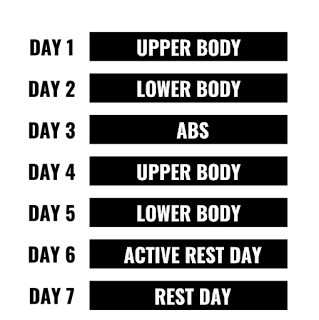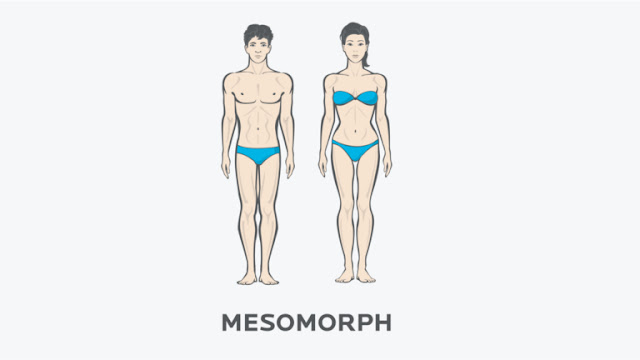KNOW YOURSELF BETTER
you might are here after my instagram post in this i am gonna cover all your body type questions
Ectomorph
Nutrition plays a crucial role in helping ectomorphs meet their fitness and body composition goals, which often include gaining lean muscle mass and maintaining a healthy weight. Here's a general nutrient plan for ectomorphs, but keep in mind that individual needs can vary, so consider consulting a registered dietitian or nutritionist for personalized guidance.
1. Caloric Intake:
- Ectomorphs typically have a fast metabolism, so they may need to consume more calories than they burn to gain weight.
- Start with a calorie surplus of around 300-500 calories per day, adjusting based on progress.
2. Protein:
- Protein is essential for muscle growth and repair. Aim for a protein intake of about 1.2 to 2.2 grams of protein per kilogram of body weight.
- Sources of protein include lean meats, poultry, fish, dairy, eggs, legumes, tofu, and plant-based protein sources like quinoa and tempeh.
3. Carbohydrates:
- Carbohydrates provide energy for workouts and help spare protein for muscle building. Aim for complex carbohydrates like whole grains, fruits, vegetables, and legumes.
- About 45-65% of your daily calorie intake should come from carbohydrates.
4. Healthy Fats:
- Include sources of healthy fats such as avocados, nuts, seeds, olive oil, and fatty fish like salmon.
- Fats are calorie-dense and can help increase overall calorie intake.
5. Meal Frequency:
- Ectomorphs may benefit from more frequent meals and snacks to ensure a steady intake of nutrients throughout the day.
- Eating every 2-3 hours can help maintain a positive calorie balance.
6. Hydration:
- Stay well-hydrated as dehydration can affect performance and recovery.
- Water is essential, but consider incorporating electrolyte-rich beverages during intense workouts.
7. Nutrient Timing:
- Consume a balanced meal or snack containing protein and carbohydrates within an hour or so before and after your workouts to support muscle growth and recovery.
8. Supplements:
- While whole foods should be the primary source of nutrients, some ectomorphs may benefit from supplements like whey protein, creatine, or branched-chain amino acids (BCAAs) to support muscle growth and recovery. Consult with a healthcare professional before starting any supplements.
9. Tracking Progress:
- Keep a food journal to monitor your calorie intake, macronutrient ratios, and overall progress. Adjust your nutrient plan based on your results.
10. Individualization:
- Remember that individual needs can vary, so adjust your nutrient plan based on your activity level, age, gender, and specific fitness goals.
WORKOUT SPLITS
MESOMORPHS
Difficulty with Weight Gain: While mesomorphs may find it easier to gain muscle mass, they can also struggle with gaining excess body fat if they're not careful with their diet and exercise regimen. Maintaining a balance between muscle gain and fat management can be a challenge.
Pressure to Maintain Physique: Mesomorphs may feel pressure to maintain their muscular physique, which can lead to stress or anxiety about their appearance. This pressure can be particularly prevalent in sports or activities where aesthetics are highly valued, such as bodybuilding or fitness modeling.
Risk of Overtraining: Mesomorphs often have a natural inclination to excel in physical activities, and this can lead to overtraining, which can result in injuries, burnout, and decreased performance.
Dietary Challenges: Maintaining a diet that supports muscle growth and recovery without excessive fat gain can be a challenge for mesomorphs. They may need to carefully monitor their calorie intake and nutrient ratios to achieve their fitness goals.
Genetics and Plateaus: Even though mesomorphs may have an advantage in building muscle, they can still hit plateaus in their training progress. Genetics can play a role in how much muscle a person can gain, and some mesomorphs may feel frustrated if they don't achieve the results they desire.
Body Image Issues: Just like individuals with other body types, mesomorphs can experience body image issues and insecurities. They may compare themselves to the "ideal" muscular physique portrayed in media and feel pressure to meet unrealistic standards.
NUTRIENT PLAN
1. Protein: Protein is essential for muscle growth and repair. Mesomorphs should aim to include lean protein sources in each meal. Good options include chicken, turkey, lean beef, fish, eggs, dairy (if tolerated), tofu, tempeh, legumes, and plant-based protein sources like quinoa and lentils. Aim for about 1.2 to 2.2 grams of protein per kilogram of body weight per day.
2. Carbohydrates: Carbohydrates provide energy for workouts and daily activities. Mesomorphs can benefit from moderate to higher carbohydrate intake, especially around workouts. Focus on complex carbohydrates like whole grains (brown rice, quinoa, oats), starchy vegetables (sweet potatoes, squash), and fruits. Adjust carb intake based on activity level and goals.
3. Fats: Healthy fats are crucial for overall health and hormone regulation. Include sources of unsaturated fats such as avocados, nuts, seeds, olive oil, and fatty fish like salmon or mackerel. Avoid trans fats and limit saturated fats.
4. Fiber: Fiber aids in digestion and helps with weight management. Whole grains, vegetables, fruits, legumes, and seeds are good sources of dietary fiber. Aim for at least 25-30 grams of fiber per day.
5. Micronutrients: Ensure you're getting an adequate intake of vitamins and minerals. A diverse diet with plenty of fruits and vegetables can help meet micronutrient needs. Consider a daily multivitamin if you have difficulty meeting all your nutrient requirements through food alone.
6. Hydration: Staying well-hydrated is crucial for overall health and athletic performance. Drink plenty of water throughout the day and consider electrolyte-rich beverages if you engage in intense workouts.
7. Meal Timing: Mesomorphs may benefit from spreading their nutrient intake across several meals a day, including pre- and post-workout meals to support muscle recovery and growth. This could involve a balanced meal 1-2 hours before exercise and a combination of protein and carbohydrates after the workout.
8. Supplements: While it's best to get most nutrients from whole foods, some mesomorphs may consider supplements such as protein powder, creatine, or branched-chain amino acids (BCAAs) to support muscle development. Consult with a healthcare professional or nutritionist before adding supplements to your routine.
9. Portion Control: Mesomorphs should monitor portion sizes to prevent overeating and unwanted fat gain. Use portion control strategies like measuring food, paying attention to hunger and fullness cues, and avoiding excessive snacking.
10. Periodic Adjustments: Your nutrient plan may need periodic adjustments based on your goals, activity level, and progress. Regularly assess your dietary habits and make changes as needed.
ENDOMORPH
Weight Management: Endomorphs often find it easier to gain weight, particularly body fat, and have a harder time losing it. This can lead to challenges in achieving and maintaining a healthy body weight.
Metabolic Rate: Endomorphs typically have a slower metabolic rate compared to other body types, which means they burn calories at a slower rate. This can make it more challenging to lose weight or maintain a lower body fat percentage.
Body Image Issues: Due to their tendency to store fat more readily, endomorphs may face body image issues and lower self-esteem. Society's beauty standards often prioritize leaner body types, which can lead to feelings of inadequacy.
Weight-Related Health Issues: Endomorphs may be at a higher risk for weight-related health issues such as heart disease, diabetes, and hypertension if they struggle to manage their weight effectively.
Dietary Challenges: Maintaining a healthy diet that supports weight management can be more challenging for endomorphs. They may need to be more mindful of calorie intake, portion sizes, and the types of foods they consume to prevent excess weight gain.
Exercise Intensity: Endomorphs may need to engage in regular, intense exercise to help boost their metabolism and manage their weight. Finding the motivation and time for consistent physical activity can be a challenge.
Genetic Factors: Genetics play a significant role in an individual's body type and propensity to gain or lose weight. Endomorphs may feel frustrated by their genetic predisposition to store fat more readily.
Social Pressures: Society often places a premium on lean body types, which can lead to societal pressures and unrealistic expectations for endomorphs to conform to these standards.
Emotional Eating: Some endomorphs may cope with stress, emotions, or boredom by turning to food, which can exacerbate weight management challenges.
Yo-Yo Dieting: Endomorphs may be more prone to yo-yo dieting, where they lose weight and then regain it, which can be detrimental to their overall health and metabolism.
NUTRIENT PLAN
1. Calorie Control: Endomorphs often need to be mindful of calorie intake because they tend to gain weight more easily. Determine your daily calorie needs based on your activity level, age, gender, and weight goals. A moderate calorie deficit (typically 300-500 calories below maintenance) can help with fat loss.
2. Protein: Protein is crucial for preserving and building lean muscle mass while promoting feelings of fullness. Include lean protein sources in your diet, such as chicken, turkey, lean beef, fish, eggs, dairy (if tolerated), tofu, tempeh, and legumes. Aim for about 1.2 to 2.2 grams of protein per kilogram of body weight per day.
3. Complex Carbohydrates: Opt for complex carbohydrates that provide sustained energy and fiber, helping control hunger. Whole grains (brown rice, quinoa, oats), starchy vegetables (sweet potatoes, squash), and legumes are excellent choices. Monitor your carbohydrate intake and adjust it based on your activity level.
4. Healthy Fats: Include sources of healthy fats, such as avocados, nuts, seeds, olive oil, and fatty fish like salmon or mackerel. These fats support overall health and can help regulate appetite.
5. Fiber: A high-fiber diet promotes satiety and helps with weight management. Aim for at least 25-30 grams of fiber per day from fruits, vegetables, whole grains, and legumes.
6. Portion Control: Be mindful of portion sizes to avoid overeating. Consider using measuring cups or a food scale to help with portion control.
7. Regular Meals: Avoid skipping meals and aim for regular meal times to stabilize blood sugar levels and prevent overeating later in the day.
8. Hydration: Drink plenty of water throughout the day to support metabolism and reduce the risk of mistaking thirst for hunger.
9. Limit Sugary and Processed Foods: Reduce or eliminate sugary beverages, processed snacks, and foods high in added sugars. These can lead to excessive calorie consumption and fat gain.
10. Balanced Snacks: If you need snacks between meals, opt for healthy options like Greek yogurt, a small handful of nuts, vegetables with hummus, or fruit.
11. Strength Training: Incorporate strength training exercises into your fitness routine to build lean muscle, which can help boost metabolism and improve body composition.
12. Cardiovascular Exercise: Include regular cardiovascular exercise (e.g., walking, jogging, cycling) to help burn calories and improve heart health. High-intensity interval training (HIIT) can also be effective for fat loss.
13. Monitor Progress: Keep a food journal to track your eating habits and make necessary adjustments to your nutrient plan based on your progress.
14. Seek Professional Guidance: Consider working with a registered dietitian or nutritionist to develop a personalized nutrient plan that addresses your specific needs and goals.
NOTE FOR ENDOMORPH -
Gaining muscle can be quite difficult for you guys but not strength there are people who are endomorph but extremely strong if you don't believe me just search anywhere world's strongest man you will get your answer
in the end, all the information is science-based, and internet research the information will help you based on your body type
There are chances that your body might be in between two categories the high chances are between ectomorph and mesomorph OR mesomorph and ectomorph in this case I'll advise you to follow the workout plan you are moving away from for example if you are endomorph and mesomorph then I will highly recommend you to take workout plan and diet advice of endomorph not mesomorph



.jpeg)


Comments
Post a Comment